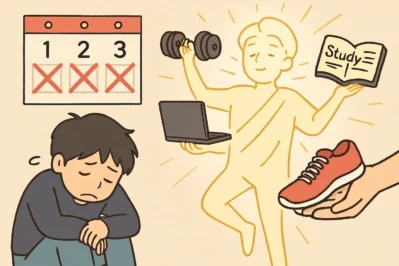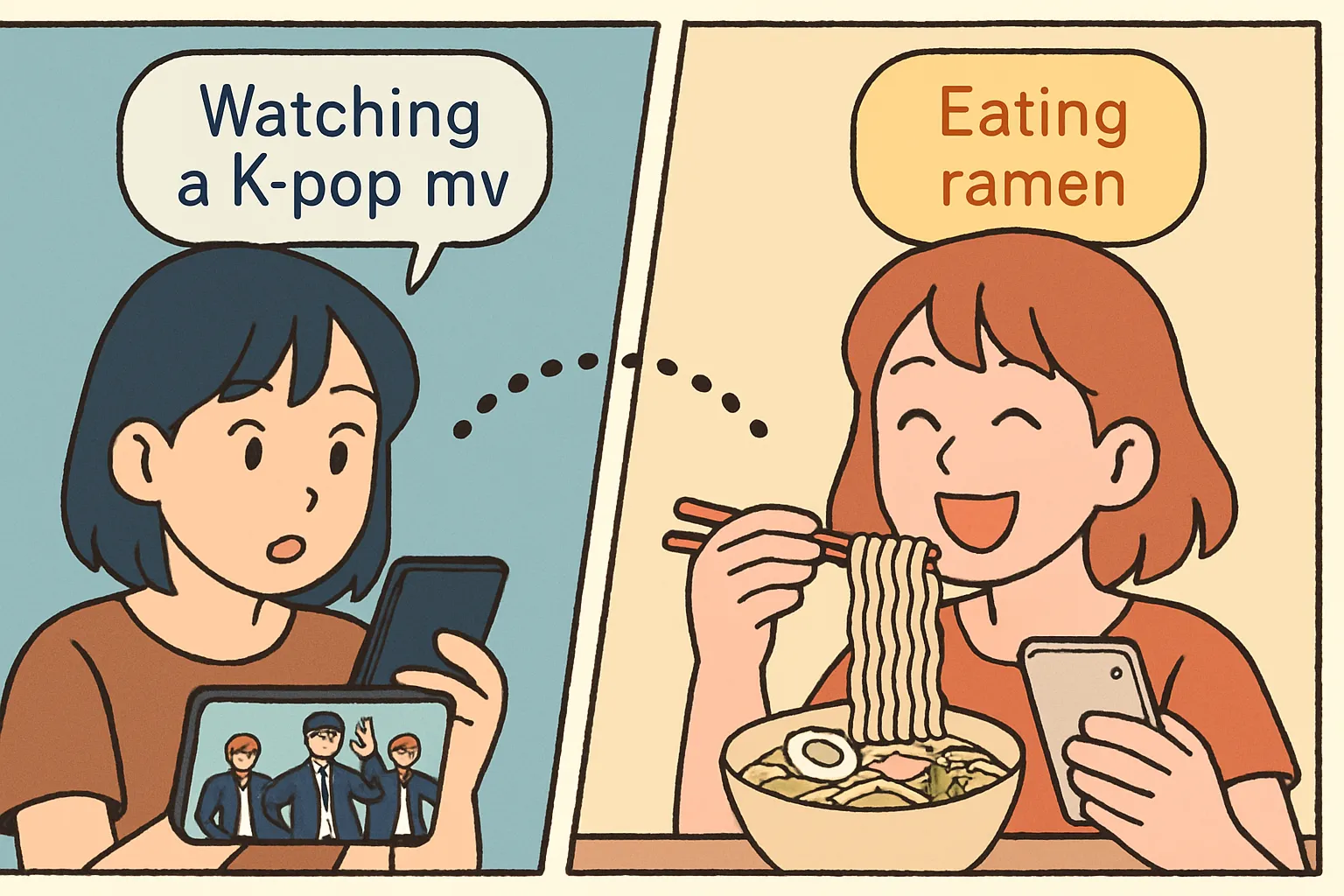Bounce Back from a ‘Jaksim Samil’ Fail!
Hello! It’s your friendly teacher from Maeil Hangeul, here to upgrade your Korean skills!
Have you ever set a perfect workout goal, only to find yourself on the couch a few days later? Don’t worry, you’re not alone! Today, we’re going to learn how to talk about this common experience and, more importantly, how to motivate yourself and your friends in Korean.
This is super useful because lately in Korea, there’s a huge trend called “갓생” (God-saeng), which means living a “God-tier life” filled with productivity, self-improvement, and—you guessed it—exercise! While it’s inspiring, it can also be pressuring. So, let’s learn some natural Korean phrases to use when our “God-saeng” plans don’t quite work out.
Key Expressions to Bounce Back
Here are three essential expressions for when your motivation takes a little hit.
1. 작심삼일 (Jaksim Samil)
- Pronunciation: [Jak-ssim-sam-il]
- English Meaning: A resolution that lasts only three days.
- Detailed Explanation: This is a very common four-character idiom (사자성어, Saja-seongeo) that perfectly describes the act of making a firm decision (작심) only for it to last just three days (삼일). It’s used when someone gives up on a new goal, like a diet or an exercise plan, very quickly. It’s not a harsh criticism; it’s often used in a lighthearted, relatable way among friends.
2. ~기는커녕 (~gi-neun-keo-nyeong)
- Pronunciation: [~gi-neun-kuh-nyeong]
- English Meaning: Far from ~ / Let alone ~
- Detailed Explanation: This grammar pattern is perfect for expressing a result that is the opposite of what you intended. You attach it to a verb stem to say, “Far from doing [verb], [the opposite] happened.” It emphasizes the gap between your goal and reality.
- Example: 아침 운동을 하기는커녕 늦잠을 잤어요. (A-chim un-dong-eul ha-gi-neun-keo-nyeong neut-jam-eul jat-seo-yo.) -> “Far from doing my morning workout, I overslept.”
3. 다시 시작하면 되지 뭐. (Dasi sijakamyeon doeji mwo.)
- Pronunciation: [Da-shi shi-ja-ka-myeon dwe-ji mwo.]
- English Meaning: I/You can just start again, so what? / It’s no big deal, we can just start over.
- Detailed Explanation: This is the ultimate motivational phrase! It’s a casual and cool way to brush off a minor failure. 다시 시작하면 되다 means “it’s okay to start again,” and adding ~지 뭐 at the end gives it a nuance of “it’s not a big deal.” It’s the perfect thing to say to a friend (or yourself!) who is feeling down about a setback.
Example Dialogue
Let’s see how these expressions work in a real conversation!
A: 아, 진짜 속상해. 이번 주부터 매일 헬스장 가기로 했는데 또 작심삼일이야.
(A, jinjja soksanghae. Ibeon ju-buteo maeil hel-seu-jang ga-gi-ro haet-neunde tto jaksim samil-iya.)
Ugh, I’m so upset. I decided to go to the gym every day starting this week, but it was another three-day resolution.
B: 괜찮아. 뭘 그런 걸로 속상해해.
(Gwaenchana. Mwol geu-reon geol-lo sok-sang-hae-hae.)
It’s okay. Why are you upset over something like that?
A: 운동으로 스트레스 풀기는커녕 스트레스가 더 쌓이는 것 같아.
(Un-dong-eu-ro seu-teu-re-seu pul-gi-neun-keo-nyeong seu-teu-re-seu-ga deo ssa-i-neun geot ga-ta.)
Far from relieving stress with exercise, I think I’m getting more stressed out.
B: 너무 완벽하려고 안 해도 돼. 오늘 쉬고 내일 다시 시작하면 되지 뭐!
(Neomu wan-byeo-ka-ryeo-go an hae-do dwae. Oneul swi-go nae-il dasi sijakamyeon doeji mwo!)
You don’t have to be so perfect. Just rest today and you can start again tomorrow, no big deal!
Culture Tip: The “갓생 (God-saeng)” & #오운완 Trend
As we mentioned, 갓생 (God-saeng) is a major trend among young Koreans, especially the Z Generation. It’s a portmanteau of “God” and “인생 (insaeng – life),” meaning an exemplary, productive life.
On Instagram, you’ll see thousands of posts with hashtags like:
- #갓생: Showcasing a productive day (studying, working, cleaning).
- #미라클모닝 (Miracle Morning): Waking up early to read, meditate, or exercise.
- #오운완 (O-un-wan): This is a super popular one. It’s short for “오늘 운동 완료” (Oneul Undong Wallyo), which means “Today’s workout complete.” People post a sweaty selfie or a picture of the gym to prove they’ve completed their workout.
While this trend is highly motivating, it also creates a culture where people can feel like a failure for skipping one day. That’s why expressions like 작심삼일 and 다시 시작하면 되지 뭐 are more important than ever. They allow people to acknowledge the pressure with a sense of humor and self-compassion. So, if you use these phrases, you’ll sound not just fluent, but also culturally aware!
Let’s Practice!
Ready to test your knowledge?
- Fill in the blank: My plan to wake up at 6 AM for a “Miracle Morning” was a total ___________. I snoozed my alarm five times!
(Hint: A four-character idiom for a failed resolution). -
Make a sentence: Your friend feels bad because they planned to study Korean but ended up watching K-dramas all night. How would you encourage them using “다시 시작하면 되지 뭐”?
Great job today, everyone! Learning to talk about small failures and motivating each other is a huge part of becoming a natural speaker.
Leave your answers to the practice questions in the comments below! Keep up the amazing work






